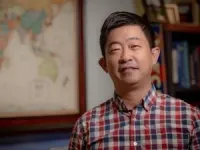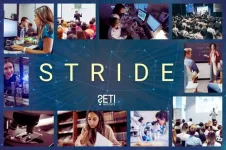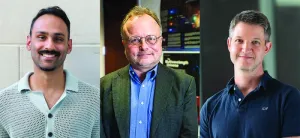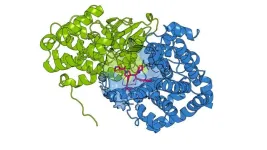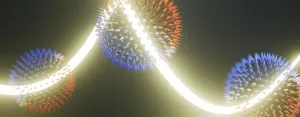(Press-News.org) A new study documents how Southern Californians are chronically being exposed to toxic airborne chemicals called plasticizers, including one that’s been banned from children’s items and beauty products.
Plasticizers are chemical compounds that make materials more flexible. They are used in a wide variety of products ranging from lunchboxes and shower curtains to garden hoses and upholstery.
“It’s not just for drinking straws and grocery bags,” said David Volz, environmental sciences professor at UC Riverside, and corresponding author of a paper about the study published in the journal Environmental Research.
Previous California monitoring programs focused on plasticizers called ortho-phthalates, some of which were phased out of manufacturing processes due to health and environmental concerns. Less research has focused on the health effects of their replacements, called non-ortho-phthalates.
This study revealed the presence of both types of plasticizers in the air throughout Southern California.
“The levels of these compounds are through the roof,” Volz said. “We weren’t expecting that. As a result, we felt it was important for people to learn about this study.”
The National Institute of Environmental Health Sciences also wants to increase the visibility of this study, one of only a few to document the phthalates’ presence in the air of urban environments. The institute’s monthly newsletter, Environmental Factor, highlights the study in their October 2024 issue.
The researchers tracked two groups of UCR undergraduate students commuting from different parts of Southern California. Both groups wore silicone wristbands designed to collect data on chemical exposures in the air.
The first group wore their wristbands for five days in 2019, and the second group wore two different wristbands for five days each in 2020. Both groups wore the bands continuously, all day, as they went about their activities. At the end of the data collection period, the researchers chopped the wristbands into pieces, then analyzed the chemicals they contained.
In a previous paper, the team focused on TDCIPP, a flame-retardant and known carcinogen, picked up in the wristbands. They saw that the longer a student’s commute, the higher their exposure to TDCIPP.
Unlike TDCIPP, which most likely migrates out of commuters’ car seats into dust, the team cannot pinpoint the origin of the plasticizers. Because they are airborne, rather than bound to dust, the wristbands could have picked them up anywhere, even outside the students’ cars.
For every gram of chopped-up wristband, the team found between 100,000 and 1 million nanograms of three phthalates, DiNP, DEHP, and DEHT. Ten total plasticizers were measured, but the levels of these three stood out.
Both DiNP and DEHP are included on California’s Proposition 65 list, which contains chemicals known to cause cancer, birth defects, or other reproductive harm. DEHT was introduced as an alternative, but its effects on human health have not been well studied.
This study suggests that introducing DEHT also has not done much to reduce the public’s level of exposure to DiNP or DEHP. Levels of all three chemicals found by Volz and his team were similar to those found by researchers in unrelated studies conducted on the East Coast.
Despite differences in climate, the air on both coasts is likely carrying similar levels of phthalates.
“No matter who you are, or where you are, your daily level of exposure to these plasticizer chemicals is high and persistent,” Volz said. “They are ubiquitous.”
To Volz, studies like this one amplify the need to find alternatives to plastic. As plastics degrade, these compounds and others like them are leaching out into the environment and into the body.
“The only way to decrease the concentration of plasticizers in the air is to decrease our production and consumption of materials containing plasticizers,” he said.
END
Airborne plastic chemical levels shock researchers
Phthalates are known reproductive toxins and carcinogens
2024-10-01
ELSE PRESS RELEASES FROM THIS DATE:
DOD awards $9M for snowpack and meltwater research and Arctic training program in Alaska and New England
2024-10-01
The Department of Defense (DOD) has awarded a $9 million contract to the University of Maine for research that will significantly expand efforts to quantify snowpack properties, explore the impact of snowmelt on the surrounding terrestrial environments of Alaska and Maine, and expand training opportunities in polar science.
The project is led by School of Earth and Climate Sciences and Climate Change Institute faculty member Seth Campbell, who will collaborate with more than a dozen other scientists from UMaine and other institutions. The effort builds on a related and existing ...
SETI Institute awards education grant through the STRIDE program
2024-10-01
SETI Institute Awards Education Grant through the STRIDE Program
October 1, 2024, Mountain View, CA – The SETI Institute awarded its first education grant through its Support Technology, Research, Innovation, Development and Education (STRIDE) program. The grant supports a new project called Encountering Stars in an Inflatable Planetarium, which will offer immersive astronomy and astrobiology experiences for elementary and middle school students in low-income areas and high school and adult audiences interested in STEM-related experiences. The program also includes a training workshop for K-12 teachers ...
NYU Historian Jennifer L. Morgan wins 2024 MacArthur “Genius Grant”
2024-10-01
New York University historian Jennifer L. Morgan, whose work focuses on the institutionalization of race-based slavery in early America and the Black Atlantic, has been named a 2024 MacArthur Fellow by the John D. and Catherine T. MacArthur Foundation.
MacArthur Fellows are recipients of the foundation’s “genius grants,” who each receive $800,000 over a five-year period to pursue intellectual, social, and artistic endeavors.
“The 2024 MacArthur Fellows pursue rigorous inquiry with aspiration and purpose,” says MacArthur Fellows Director ...
Research in 4 continents links outdoor air pollution to differences in children’s brains
2024-10-01
Outdoor air pollution from power plants, fires and cars continues to degrade human, animal and environmental health around the globe. New research shows that even pollution levels that are below government air-quality standards are associated with differences in children’s brains.
A University of California, Davis, research team systematically analyzed 40 empirical studies, the majority of which had found that outdoor air pollution is associated with differences in children’s brains. These differences include volumes of white matter, which is associated with ...
UTA physicists explore possibility of life beyond Earth
2024-10-01
Are there planets beyond Earth where humans can live? The answer is maybe, according to a new study from University of Texas at Arlington physicists examining F-type star systems.
Stars fall into seven lettered categories according to their surface temperature. They also differ in other factors including mass, luminosity, and radius. F-types are in the middle of the scale, hotter and more massive than our sun. F-type stars are yellowish white in color and have surface temperatures of more than 10,000 degrees.
A habitable zone (HZ) is the distance from a star at which water could exist on orbiting planets’ surfaces. In the research led by doctoral student Shaan Patel ...
Seeing double: Designing drugs that target “twin” cancer proteins
2024-10-01
LA JOLLA, CA—Some proteins in the human body are easy to block with a drug; they have an obvious spot in their structure where a drug can fit, like a key in a lock. But other proteins are more difficult to target, with no clear drug-binding sites.
To design a drug that blocks a cancer-related protein, Scripps Research scientists took a hint from the protein’s paralog, or “twin.” Using innovative chemical biology methods, the scientists pinpointed a druggable site on the paralog, and then used that knowledge to characterize drugs that bound to a similar—but more difficult to detect—spot on its twin. Ultimately, they found drugs ...
Fierce names Insilico Medicine as one of its Fierce 50 Honorees of 2024
2024-10-01
Cambridge, MA, Sept. 26, 2024 –Insilico Medicine, a clinical-stage generative AI-driven drug discovery company, announced today that Fierce Life Sciences and Fierce Healthcare have named Insilico Medicine as one of 2024’s Fierce 50 honorees. The Fierce 50 showcases 50 individuals and companies driving advancements in medicine, fostering innovation and shaping the future of biopharma and healthcare.
“The annual Fierce 50 special report highlights individuals and companies that are driving progress in the pharmaceutical, healthcare and biotechnology industries,” said Ayla Ellison, Editor-in-Chief of Fierce Life Sciences and Healthcare. “These 50 outstanding ...
Cleveland Clinic researchers build first large-scale atlas of how immune cells react to mutations during cancer immunotherapy
2024-10-01
A Cleveland Clinic-led research collaboration between Timothy Chan, MD, PhD, Chair of Cleveland Clinic’s Global Center for Immunotherapy, and Bristol Myers Squibb has published the most comprehensive overview to date of how the immune system reshapes tumor architecture in response to immune checkpoint therapy.
The eight-year study, published in Nature Medicine, outlines how cancer immunotherapy induces tumor recognition through neoantigens to reshape the tumor ecosystem. Neoantigens are small peptides produced when cancer cells mutate and are a primary marker for the immune system to recognize cancer cells as different ...
Pioneering quantum computer research continues in Baden-Württemberg
2024-10-01
Utilizing the potential of quantum computers and achieving a real advantage for practical applications — this goal is being pursued worldwide. In Baden-Württemberg, the Competence Center Quantum Computing Baden-Württemberg (KQCBW) has dedicated itself to this goal over the past four years. Great progress has been made in various areas of quantum computing in successful joint projects. The success of the KQCBW is now to be continued and the unique quantum computing ecosystem in the state further expanded.
The KQCBW will be continued in a ten-month transfer project ...
Discovery of orbital angular momentum monopoles enables orbital electronics with chiral materials
2024-10-01
In traditional electronics, information is transferred using the charge of electrons. However, future technologies may rely on a different property of electrons—their intrinsic angular momentum. Historically, the focus has been on electron spin, a form of build-in angular momentum that creates a magnetic moment, as the leading candidate for next-generation devices. Now, researchers are exploring the potential of orbitronics, a field that utilizes the angular momentum of electrons generated as they orbit the atomic nucleus. Orbitronics holds great promise ...
LAST 30 PRESS RELEASES:
Children born with upper limb difference show the incredible adaptability of the young brain
How bacteria can reclaim lost energy, nutrients, and clean water from wastewater
Fast-paced lives demand faster vision: ecology shapes how “quickly” animals see time
Global warming and heat stress risk close in on the Tour de France
New technology reveals hidden DNA scaffolding built before life ‘switches on’
New study reveals early healthy eating shapes lifelong brain health
Trashing cancer’s ‘undruggable’ proteins
Industrial research labs were invented in Europe but made the U.S. a tech superpower
Enzymes work as Maxwell's demon by using memory stored as motion
Methane’s missing emissions: The underestimated impact of small sources
Beating cancer by eating cancer
How sleep disruption impairs social memory: Oxytocin circuits reveal mechanisms and therapeutic opportunities
Natural compound from pomegranate leaves disrupts disease-causing amyloid
A depression treatment that once took eight weeks may work just as well in one
New study calls for personalized, tiered approach to postpartum care
The hidden breath of cities: Why we need to look closer at public fountains
Rewetting peatlands could unlock more effective carbon removal using biochar
Microplastics discovered in prostate tumors
ACES marks 150 years of the Morrow Plots, our nation's oldest research field
Physicists open door to future, hyper-efficient ‘orbitronic’ devices
$80 million supports research into exceptional longevity
Why the planet doesn’t dry out together: scientists solve a global climate puzzle
Global greening: The Earth’s green wave is shifting
You don't need to be very altruistic to stop an epidemic
Signs on Stone Age objects: Precursor to written language dates back 40,000 years
MIT study reveals climatic fingerprints of wildfires and volcanic eruptions
A shift from the sandlot to the travel team for youth sports
Hair-width LEDs could replace lasers
The hidden infections that refuse to go away: how household practices can stop deadly diseases
Ochsner MD Anderson uses groundbreaking TIL therapy to treat advanced melanoma in adults
[Press-News.org] Airborne plastic chemical levels shock researchersPhthalates are known reproductive toxins and carcinogens

